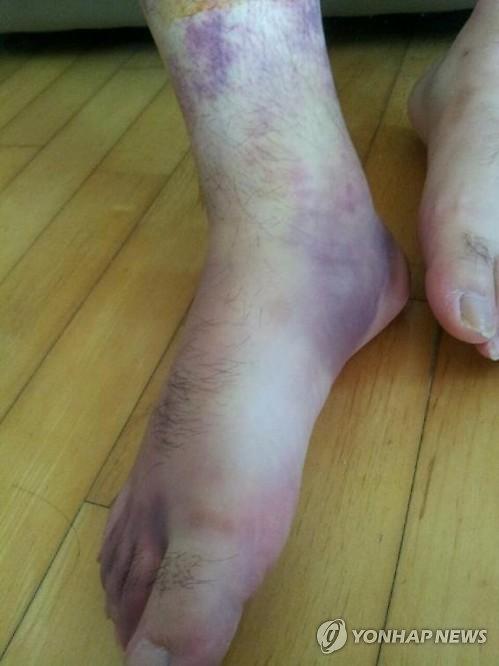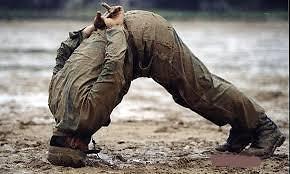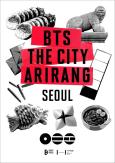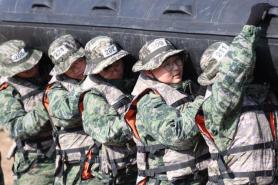
This photograph shows bruised legs of a house officer who was beaten by an assistant professor at the Busan National University Hospital. [Yonhap / The office of Yoo Eun-hye, a lawmaker of the ruling Democratic Party. ]
SEOUL -- Two medical doctors were indicted by prosecutors Tuesday for habitually inflicting cruel treatment or beating with baseball bats and other objects at a hospital in the southern city of Busan. The case revealed stern senior-junior relations at South Korea's medical community.
Harsh treatment at the Busan National University Hospital came to light during a parliamentary inspection in October last year. More than 20 house officers were found to have been punished allegedly for insincere working attitudes.
A 39-year-old doctor identified by his surname Shin, who was expelled as the hospital's professor for his wrongdoing, was charged with habitual infliction of injuries after investigators found he had physically abused 11 house officers about 50 times between August 2013 and September 2015.

"Wonsan Bombing" is a form of punishment frequently used in the military until the early 2000s. [Online Community]
A 34-year-old assistant professor, identified as Koh, was accused of forcing 12 juniors to take the so-called "Wonsan Bombing" position, a form of punishment used at military camps. He was charged with beating them with aluminum baseball bats and other objects. Those who were severely bruised and injured by Koh's beatings treated each other.
Harassment and abuse have rooted deep in the South Korean medical sector where colleagues sometimes bully each other in order to maintain a seamless working culture or prevent mistakes.
Last year, the culture of "Taeugi" (a verb meaning "to burn" in Korean), which means consistent verbal and mental bullying, has come to the surface following news reports that female nurses quit their jobs or in worst cases, killed themselves. Taeugi describes the state of nurses whose heart got scorched and burned down to ashes.
"Taeugi derived from poor working conditions and a manpower shortage in the medical sector," a 32-year-old nurse who identified her family name Jung told Aju News. "At hospitals, a mistake means death. People constantly remind each other of the importance of doing their job properly."
Nurses being targeted by Taeugi should often quit because of bullying, Jung said, adding pregnancy sometimes leads to bullying because colleagues had to share the burden. Jung left a large hospital because of stress to work at a small hospital for old people.
Copyright ⓒ Aju Press All rights reserved.




